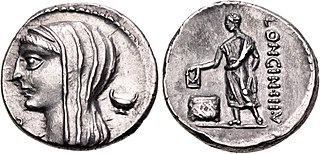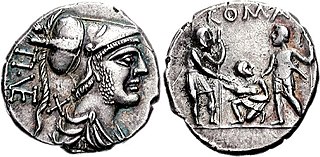Related Research Articles

The gens Valeria was a patrician family at ancient Rome, prominent from the very beginning of the Republic to the latest period of the Empire. Publius Valerius Poplicola was one of the consuls in 509 BC, the year that saw the overthrow of the Tarquins, and the members of his family were among the most celebrated statesmen and generals at the beginning of the Republic. Over the next ten centuries, few gentes produced as many distinguished men, and at every period the name of Valerius was constantly to be found in the lists of annual magistrates, and held in the highest honour. Several of the emperors claimed descent from the Valerii, whose name they bore as part of their official nomenclature.

The gens Furia, originally written Fusia, and sometimes found as Fouria on coins, was one of the most ancient and noble patrician houses at Rome. Its members held the highest offices of the state throughout the period of the Roman Republic. The first of the Furii to attain the consulship was Sextus Furius in 488 BC.

The gens Cassia was a Roman family of great antiquity. The earliest members of this gens appearing in history may have been patrician, but all those appearing in later times were plebeians. The first of the Cassii to obtain the consulship was Spurius Cassius Vecellinus, in 502 BC. He proposed the first agrarian law, for which he was charged with aspiring to make himself king, and put to death by the patrician nobility. The Cassii were amongst the most prominent families of the later Republic, and they frequently held high office, lasting well into imperial times. Among their namesakes are the Via Cassia, the road to Arretium, and the village of Cassianum Hirpinum, originally an estate belonging to one of this family in the country of the Hirpini.
The gens Papiria was a patrician family at ancient Rome. According to tradition, the Papirii had already achieved prominence in the time of the kings, and the first Rex Sacrorum and Pontifex Maximus of the Republic were members of this gens. Lucius Papirius Mugillanus was the first of the Papirii to obtain the consulship in 444 BC. The patrician members of the family regularly occupied the highest offices of the Roman state down to the time of the Punic Wars. Their most famous member was Lucius Papirius Cursor, five times consul between 326 and 313 BC, who earned three triumphs during the Samnite Wars. Most of the Papirii who held office under the later Republic belonged to various plebeian branches of the family. Although the most illustrious Papirii flourished in the time of the Republic, a number of the family continued to hold high office during the first two centuries of the Empire.
The gens Afrania was a plebeian family at Rome, which is first mentioned in the second century BC. The first member of this gens to achieve prominence was Gaius Afranius Stellio, who became praetor in 185 BC.
The gens Gegania was an old patrician family at ancient Rome, which was prominent from the earliest period of the Republic to the middle of the fourth century BC. The first of this gens to obtain the consulship was Titus Geganius Macerinus in 492 BC. The gens fell into obscurity even before the Samnite Wars, and is not mentioned again by Roman historians until the final century of the Republic.
The gens Alliena or Aliena was a minor plebeian family of the Roman Republic. The first member of the gens to achieve prominence was Lucius Alienus, plebeian aedile in 454 BC. However, the family then slipped into obscurity for several centuries, emerging once more in the first century BC.

The gens Antistia, sometimes written Antestia on coins, was a plebeian family at ancient Rome. The first of the gens to achieve prominence was Sextus Antistius, tribune of the plebs in 422 BC.
The gens Servilia was a patrician family at ancient Rome. The gens was celebrated during the early ages of the Republic, and the names of few gentes appear more frequently at this period in the consular Fasti. It continued to produce men of influence in the state down to the latest times of the Republic, and even in the imperial period. The first member of the gens who obtained the consulship was Publius Servilius Priscus Structus in 495 BC, and the last of the name who appears in the consular Fasti is Quintus Servilius Silanus, in AD 189, thus occupying a prominent position in the Roman state for nearly seven hundred years.

The gens Veturia, originally Vetusia, was an ancient patrician family of the Roman Republic. According to tradition, the armourer Mamurius Veturius lived in the time of Numa Pompilius, and made the sacred ancilia. The Veturii occur regularly in the Fasti Consulares of the early Republic, with Gaius Veturius Geminus Cicurinus holding the consulship in 499 BC. Like other old patrician gentes, the Veturii also developed plebeian branches. The family declined in the later Republic, with the last consular Veturius holding office in 206 BC, during the Second Punic War.

The gens Sergia was a patrician family at ancient Rome, which held the highest offices of the Roman state from the first century of the Republic until imperial times. The first of the Sergii to obtain the consulship was Lucius Sergius Fidenas in 437 BC. Despite long and distinguished service, toward the end of the Republic the reputation of this gens suffered as a result of the conspiracy of Catiline.
The gens Coruncania was a plebeian family at ancient Rome. The first of the family to come to prominence was Tiberius Coruncanius, a novus homo who became consul in 280 BC, and dictator in 246.
The gens Poetelia or Poetilia was a plebeian family at ancient Rome. Members of this gens are first mentioned in the time of the Decemvirs, and from thence down to the Second Punic War, they regularly held the chief magistracies of the Roman state. After this, however, they fade into obscurity, and are only occasionally mentioned. The nomen Poetelius is sometimes confused with Petillius, and can be found with either a single or double 'l'.
The gens Rupilia, occasionally written Rupillia, was a minor plebeian family at ancient Rome. Members of this gens are first mentioned in the latter part of the Republic, and Publius Rupilius obtained the consulship in 132 BC. Few others achieved any prominence, but the name occurs once or twice in the consular fasti under the Empire. The name is frequently confounded with the similar Rutilius.
The gens Seria was a minor plebeian family at ancient Rome. Members of this gens rose to prominence during the second century, attaining the consulship twice, and holding various other offices under the Nerva-Antonine dynasty.
The gens Spurilia, sometimes spelled Spurillia, was an obscure plebeian family at ancient Rome. Hardly any members of this gens are mentioned by ancient writers, for the Spurilius mentioned in some manuscripts of Livy as tribune of the plebs in 422 BC is amended by some authorities to "Spurius Icilius", while it is uncertain whether the moneyer who issued denarii in 139 BC was named Spurius, Spurilius, or Spurinna. Nevertheless, a number of Spurilii are known from inscriptions.
Spurius Nautius Rutilus was a consular tribune of the Roman Republic in 424 BC.
Quintus Fabius Vibulanus was a consul of the Roman Republic in 423 BC and a consular tribune in 416 and 414 BC.
Spurius Nautius Rutilus was a consul of the Roman Republic in 411 and a consular tribune in 419, 416 and 404 BC.
Publius Lucretius Tricipitinus was a consular tribune of the Roman Republic in 419 and 417 BC.
References
- 1 2 3 Dictionary of Greek and Roman Biography and Mythology, vol. II, p. 1145 ("Nautia Gens").
- ↑ Dionysius, vi. 4.
- ↑ Vergil, Aeneid, v. 704, with the note of Servius.
- ↑ Chase, p. 110.
- ↑ Dionysius, vi. 69, viii. 16 ff.
- ↑ Livy, ii. 39.
- ↑ Broughton, vol. I, p. 19.
- ↑ Livy, ii. 52, iii. 25, 26, 29.
- ↑ Dionysius, ix. 28, 35, x. 22, 23, 25.
- ↑ Broughton, vol. I, pp. 27, 28, 39.
- ↑ Livy, iv. 35.
- ↑ Broughton, vol. I, p. 68.
- ↑ Livy, iv. 44, 47, 61.
- 1 2 3 Fasti Capitolini.
- ↑ Broughton, vol. I, pp. 71, 73, 81.
- ↑ Livy, iv. 52.
- ↑ Broughton, vol. I, pp. 76, 77.
- ↑ Livy, ix. 21.
- ↑ Broughton, vol. I, p. 155.
- ↑ Livy, x. 41, 44.
- ↑ Broughton, vol. I, p. 181.
- ↑ Broughton, vol. I, p. 185.
- ↑ Florus, i. 18. § 17.
- ↑ Sherk, "Senatus Consultum De Agro Pergameno", p. 368.
- ↑ CIL I, 3480b, AE 1909, 76a.
- ↑ CIL VI, 34004.
- 1 2 CIL VI, 10396
- ↑ CIL VI, 22893.
- ↑ CIL X, 3699, AE 2010, 281.
- ↑ CIL X, 8269.
- ↑ CIL XV, 7488, AE 1999, 301.
- 1 2 AE 1997, 737.
- ↑ AE 1955, 238.